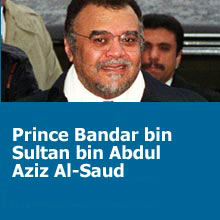Prince Bandar is the child of Prince Sultan and one of his servants, but under Sharia, the Islamic law that governs Saudi Arabia, all sons are considered born equal and are to be afforded similar status. Though Bandar spent his early years living apart from his father, when he was eleven he and his mother were both invited to live with the royal family. At the time, the young prince was not considered one of the most promising Saud sons, but his grandmother saw that the boy was sharp and determined to create his own opportunities. Later, as a young man, he also won the attention of his uncle, King Fahd.
After pursuing a career as a fighter pilot, Prince Bandar turned to public policy, studying at Johns Hopkins University. In 1983, King Fahd appointed him ambassador to the United States. Bandar soon became known on Capitol Hill for his flashy style, and more importantly, his smooth political dealings as a Washington insider. In early 2001, Prince Bandar helped broker President Clinton’s failed eleventh hour plan for peace in the Middle East. Today, Bandar is known to have close personal and political ties with President Bush, and he purportedly enjoys easy access to the Oval Office. However, the ambassador’s intimate relations with the current administration have proven controversial on more than one occasion: In April, 2004 it was reported that Bandar assured President Bush that he would work to keep oil prices low leading up to the presidential election in November.
On June 1, 2004, Prince Bandar printed an extraordinary statement in AL-WATAN, a Saudi newspaper partly owned by Prince Bandar bin Khalid. The editorial accused the kingdom of seeking to blame its problems with terrorism on foreign influences while failing to look at the domestic causes of violence, and urged clerics to support a “jihad” against terrorist campaigns. Such critical views and candor are rarely glimpsed inside the tightly controlled Saudi press.
Prince Bandar resigned from his post as Ambassador to the U.S. in July, 2005. He is expected to take a high-level appointment within the Saudi government which could further his chances of becoming the first second generation prince to ascend the throne.



